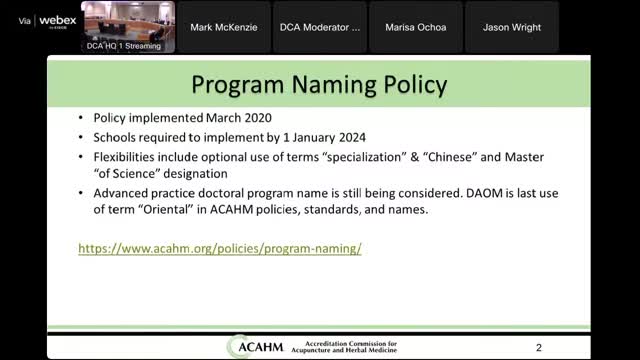Accreditor tells board it requires English proficiency, distance‑education accreditation and has new program‑naming rules
Get AI-powered insights, summaries, and transcripts
Subscribe
Summary
The Accreditation Commission for Acupuncture and Herbal Medicine outlined its 2024–24 program-naming policy, English-language proficiency requirements for students, and its distance-education accreditation process after pandemic flexibilities ended on Oct. 7, 2023.
Representatives from the national accreditor Accreditation Commission for Acupuncture and Herbal Medicine (ACOM) briefed the California Acupuncture Board on March 7 about several accreditation policies that intersect with state oversight.
Mark McKenzie, ACOM executive director, and Jason Wright, director of accreditation services, told board members ACOM adopted a program-naming policy that requires clearer names distinguishing whether a program includes Chinese herbal medicine; for example schools may use names such as "Master of Acupuncture and Herbal Medicine" or "Master of Science in Acupuncture and Herbal Medicine." The policy implementation date was January 1, 2024.
English-language proficiency: ACOM’s standards require programs to have explicit English-proficiency admission policies. For international applicants whose native language is not English, the commission lists acceptable standardized tests (TOEFL iBT, IELTS academic, Duolingo English Test, and others) and minimum scores in Accreditation Criterion 5.02. Wright said programs may also accept evidence of prior education delivered in English as a demonstration of proficiency.
COVID-era flexibilities and distance education: ACOM told the board it did not change standards during the COVID emergency; instead the commission granted temporary flexibilities allowing some distance delivery of classroom and clinical observation hours so students could meet clock-hour requirements during the emergency. Those flexibilities ended when the national emergency expired on Oct. 7, 2023; schools that want to continue any distance delivery now must obtain ACOM’s distance-education accreditation. ACOM said it has accredited many programs for limited distance delivery but prohibits remote delivery of hands-on point-location training and the bulk of clinical internship hours. Observation hours are the most commonly approved for limited remote delivery (ACOM permits up to half of the 150 minimum observation hours to be remote in some programs, with at least 75 hours in-person required).
Why it matters: ACOM accreditation and naming affect how programs present curricula to students and how states and employers interpret degree titles. The commission emphasized that program names now aim to reduce confusion about whether herbal medicine training is included.
Ending: ACOM representatives invited questions and said they will publish process updates; board members said they want further outreach so California stakeholders can weigh in on naming and degree-level questions.
